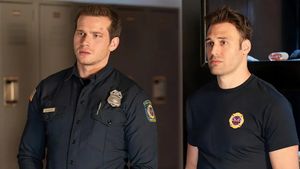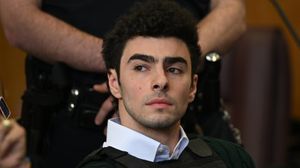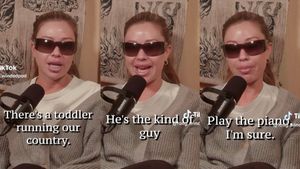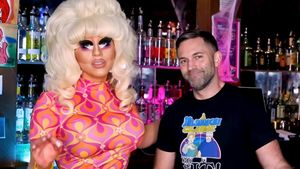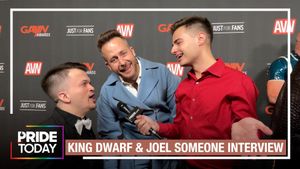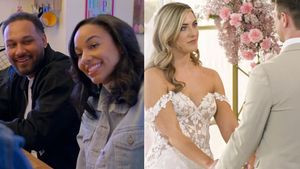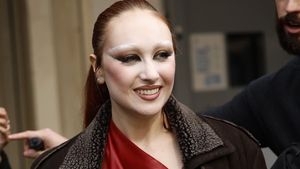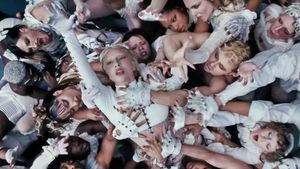At 6:45 a.m.
Tuesday, Cynthia Wade received the call she was hoping for:
Her film Freeheld was nominated for an Academy
Award in the short documentary field. Freeheld
tells the wrenching story of policewoman Laurel
Hester's battle to bequeath her 25-year pension
to her partner of six years, auto mechanic Stacie
Andree, before Laurel died of lung cancer. The governing
"Freeholders" of the conservative stronghold
of Ocean County, N.J., did not want to grant that
right to same-sex partners, even though they had the
legal authority to do so.
The Advocate spoke to filmmaker Wade on the
afternoon of her big day: She called from snowy Park City,
Utah, where she was attending the Sundance Film
Festival (the event where, a year before,
Freeheld won a Special Jury Prize).
Cynthia Wade shooting Freeholders meetings
How does it feel to win an Oscar nomination? It's been an amazing day. I'm
thrilled. We all thought we had a good, healthy shot,
but you never know these things.
The genesis of Freeheld was that you and a
small crew just showed up at a meeting of the
Freeholders where they were discussing Laurel's case. I had two cameras, two assistants, and release
forms. I didn't know that they'd let me
shoot. And within 15 minutes I knew this was my next film
and I'd throw everything aside professionally in my
life to do this.
And they just let you shoot? There was a hush and tension in the room and I
thought, All right, let me start shooting unless someone
tells me to stop. It turns out that in New
Jersey you can film anything at a public meeting.
That's the law. And I didn't need release
forms from the Freeholders. Afterward, I went up to
Laurel and Stacie and introduced myself and asked if I
could tell their story. And Laurel said yes. She had
always wanted to write a book, and realized she was running
out of time.
You spent a lot of time with Laurel and Stacie
during the last 10 weeks of Laurel's life, often
staying over at their house. It was just me and Laurel in the house during
the day in early December [2005], looking at old
photos and newspaper articles about her life as a
detective. She actually seemed in a better mood and less
depressed doing that. Stacie was at the auto shop all
day, and there was definitely a wariness from her in
the beginning -- Who is this filmmaker, and why has
Laurel let her come into our lives? But as
Laurel got sicker, Stacie began to lean on me more and liked
me coming down [Webb lives in Brooklyn, N.Y.].
That's when I crossed the line into being a
friend. There's a tradition in documentary film that
you should be this fly on the wall, but there was so
much at stake with them that I didn't feel I
could do that.
You're a straight woman, married with two kids --
did that make it more challenging to film a movie about
a lesbian couple? I went to Smith College -- certainly my friends
at Smith had better social lives than I did as a
straight woman! I went to the Stanford doc program,
which was heavily lesbian. And I live in Park Slope, where
my older daughter, when she was 2, asked me,
"How come I don't have two
mommies?" So I have always been an outsider.
You understand what it's like to be gay! And I have to say that I was scared to out
myself as straight to Laurel and Stacie when I first
met them. I was afraid they were going to judge me! So
I did something I still have mixed feelings about: When I
shot that first meeting, I took my wedding rings off.
After our first shoot away from the hearings -- at the
hospital, when Laurel got the diagnosis that her
cancer had spread to her brain -- I slipped my rings back on
my finger and started talking about my kids. Later,
Stacie asked me, "Why didn't you wear your
rings the first couple of times we met you?" I said I
wanted them to know me as a person first. She said, "I
understand, because I hide [my sexuality] sometimes too."
Do you think this film will serve as an activist
tool against LGBT discrimination? I think at the heart of a documentary should
just be a really good story, but the fact that there
are so many Laurel Hesters across the country and the
fate of many same-sex couples is similar, I would be remiss
if we didn't use it as a tool and use the Oscar
campaign as a strategy in the 2008 elections. I
certainly don't want to live in an America where only
certain people get certain rights. My marriage is absolutely
no different from Stacie and Laurel's.
Finally, the question we can't help but ask: What
are you going to wear to the Oscars? Oh, my God, I have to find a dress in four
weeks!






























